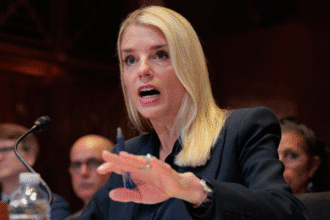With intentions to do so on his first day back in office next month, President-elect Donald Trump has promised to act swiftly on pardoning individuals found guilty of participation in the January 2021 US Capitol Riot.
- Will Trump revoke birthright citizenship and overhaul immigration?
- Will Trump hunt responsibility for political rivals?
- How Will Trump Approach Economic Policies and Social Security?
- Will Trump restrict abortion and advocate changes in health policies?
- Will Trump Change American Foreign Policy and Cut Aid to Ukraine?
- What Executive Orders on Day One Will Trump Issue?
- End
Trump said, “We’re going to look at independent cases,” in an exclusive interview, adding that he would act “very quickly” and most likely pardon “first day.”
On January 6, 2021, a crowd of Trump supporters stormed the Capitol building to reverse the 2020 presidential election results during the Capitol Riot. Numerous rioters have been found guilty and sentenced. Trump’s remarks indicate his support of individuals found guilty of crimes connected to the uprising.
Their lives are destroyed, Trump said. “They have been in there for years; they are in a filthy, disgusting place that shouldn’t even be allowed to be open.”
Will Trump revoke birthright citizenship and overhaul immigration?
Trump also reaffirmed his position on immigration, pledging to revoke birthright citizenship—a concept ingrained in the 14th Amendment that gives everyone born on American territory automatic citizenship.
About the constitutional clause, Trump remarked, “We’re going to have to get it changed.” “We could have to return to the people. Nevertheless, we have to stop it.” Trump’s remarks might inspire legal challenges and a possible conflict with Congress over the evolution of birthright citizenship.
Saying, “I don’t want to be breaking up families…the only way you don’t break up the family is you keep them together, and you have to send them all back,” Trump also underlined his will to deport illegal immigrants, especially those with family members who are US citizens.
Although Trump has long promised to tighten immigration restrictions, he has indicated openness to working with Democrats to help Dreamers—undocumented immigrants brought to the United States as children. “I will work with the Democrats on a plan,” he said, noting that some Dreamers had effectively created businesses and employment in the United States, building lives.
Will Trump hunt responsibility for political rivals?
The conversation also covered Trump’s remarks about exacting revenge against political rivals. Emphasizing the future, Trump said he would not instruct the Justice Department to look at President Joe Biden or his family, despite a past of threatening legal steps against his opponent. “I’m not looking to dig back into the past,” Trump remarked. “I want our nation to thrive. Retribution will go via success.
Trump, however, was unambiguous in his criticism of those looking into the Capitol incident, especially members of the now-defunct Democratic-led House committee. He proposed that those legislators—including former Representative Liz Cheney—should be sentenced for their deeds. “They ought to wind up in jail,” he said.
Reacting to Trump’s words, vociferous opponent of former president Cheney shot back, claiming his remarks constituted a “continuation of his assault on the rule of law and the foundations of our republic.”
How Will Trump Approach Economic Policies and Social Security?
Reiterating his stance on the campaign road, Trump said he would not seek to diminish Social Security or raise its eligibility age. Though he offered no details, he suggested he aimed to make the program “more efficient.”
Regarding economic policy, Trump said unequivocally that he would pursue an aggressive tariff plan targeted at significant US trading partners, even though he acknowledged that this could cause consumer prices to rise. “I can’t guarantee anything,” Trump said while questioning whether his tariffs would cause American prices to rise. “I’m not sure tomorrow.”
Trump’s posture on NATO also made news as his allegiance to the military alliance would rely on member nations’ performance of their financial responsibilities. “If they’re paying their bills and if I believe they’re treating us fairly, the answer is, I would stay with NATO,” Trump stated.
Will Trump restrict abortion and advocate changes in health policies?
Trump’s posture on reproductive rights also seemed to be very unclear. Pressing about restrictions on abortion drugs, he claimed he would not seek to impose any additional constraints but added, “Well, I commit. I mean… things evolve.”
Regarding health policy, Trump proposed that although several worldwide studies have refuted this allegation, his choice for health secretary, vaccine skeptic Robert F. Kennedy Jr., would investigate the possible link between autism and childhood vaccinations. “Somebody has to find out,” Trump remarked.
Will Trump Change American Foreign Policy and Cut Aid to Ukraine?
Regarding foreign policy, Trump mentioned that if he had returned to the White House, the United States might have provided less assistance to Ukraine. “Ukraine should probably expect less aid,” he remarked. A long skeptic of US backing for Ukraine’s defense against Russian aggression, Trump has maintained that the nation should concentrate more on domestic problems.
What Executive Orders on Day One Will Trump Issue?
Once he took office on January 20, Trump pledged several executive orders. These would probably comprise adjustments in economic policies, energy rules, and immigration laws. He made it quite evident that his presidency would start strong. “We are going to have a lot of executive orders covering immigration, energy, and the economy,” he stated.
End
Donald Trump’s pledges to broaden reforms on immigration, the economy, and responsibility abound as he prepares to take office in January. His strict foreign policy, assault on birthright citizenship, and intentions for pardons are likely to spark significant legal challenges and discussion. With both allies and enemies keenly observing his every step, how these decisions turn will determine the course of his presidency.
Trump Finalizes Cabinet Picks: Brooke Rollins Tapped as Secretary of Agriculture








